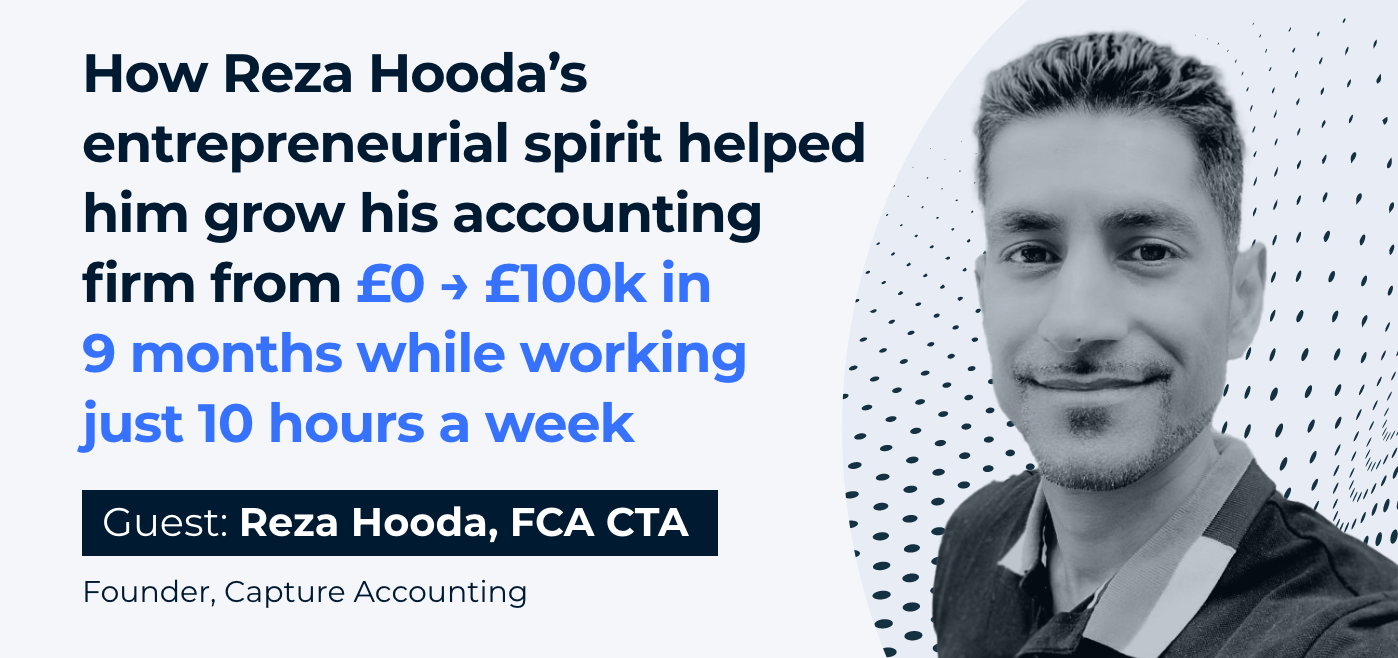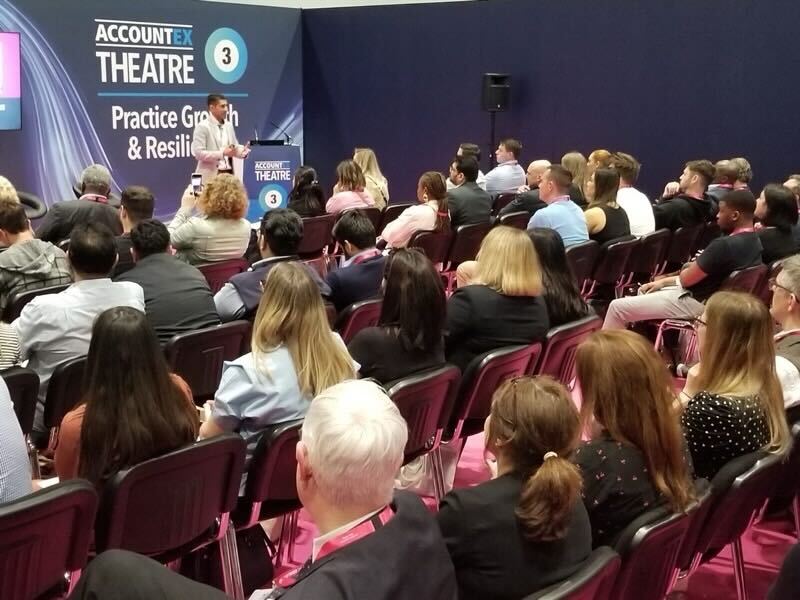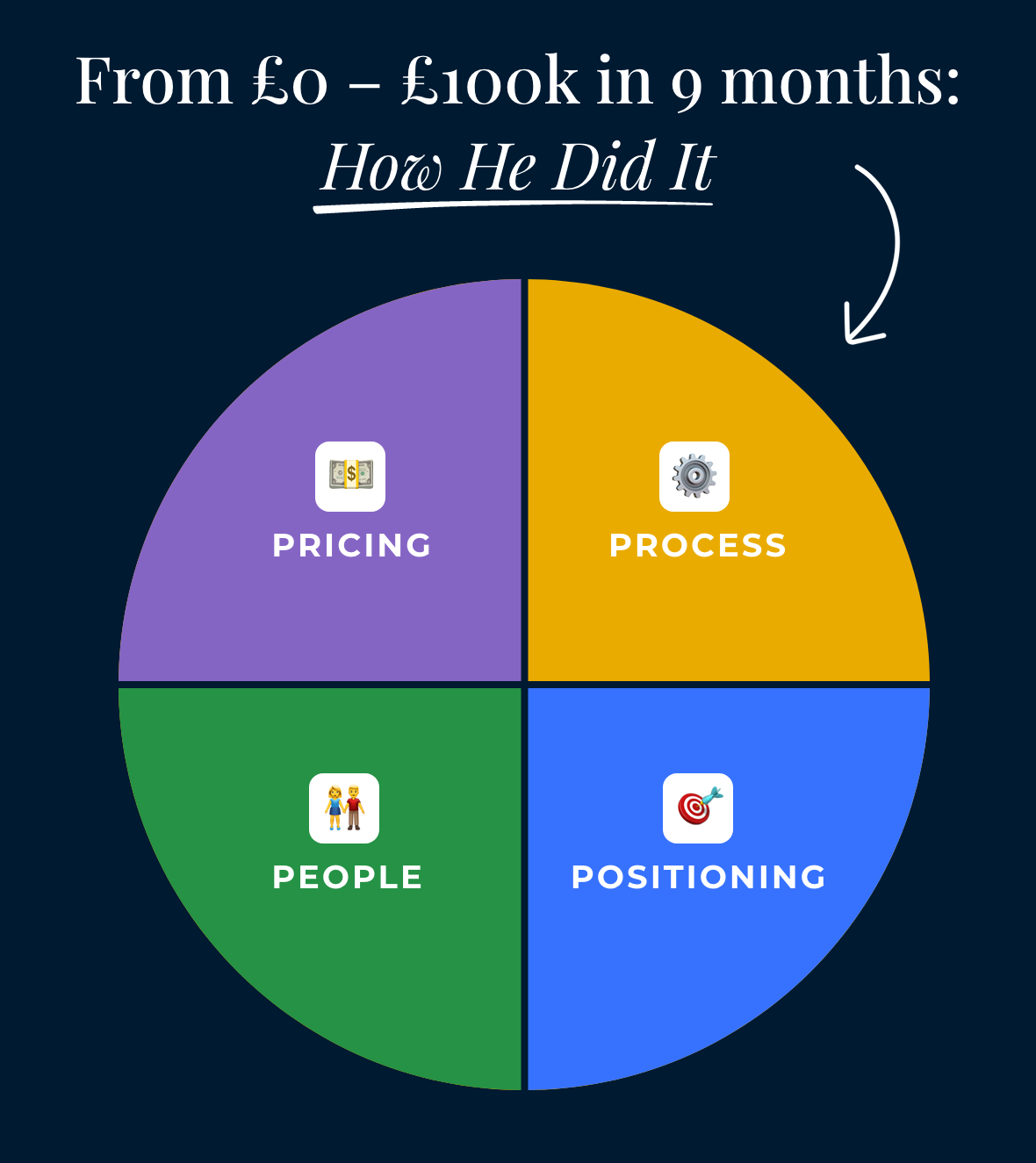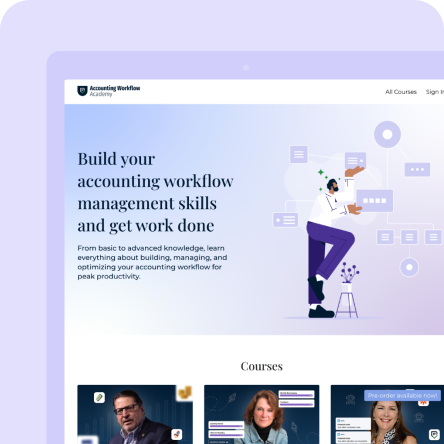Your Cents’ Worth is a monthly series that explores inspiring stories of accounting and bookkeeping firm owners who are building their dream firms and a life they love.
A 90-minute webinar on practice growth gave Reza the launchpad he was looking for, and in less than 24 months, his first accounting firm took an upward shift.
Now, with his second firm, which he grew from £0 to £100k in 9 months, he is on a mission to help accounting firm owners become more profitable, giving them the time, money, and freedom they crave.
Reza Hooda, FCA CTA, is a Chartered Accountant and Tax Advisor who runs his own firm on the sunny South Coast called Walji & Co. Previously, Reza worked for the world’s largest accounting and taxation services provider PricewaterhouseCoopers (PwC). Within PwC, Reza specialized in providing tax-efficient solutions to entrepreneurs and owner-managed businesses.
Outside of work, he has his hands full with four young children who ensure that weekends never have a dull moment.
Financial Cents spoke to Reza about how he made his firm profitable, the niche he focused on, and the shift toward value-based pricing over hourly billing. Additionally, he highlights the critical role of empowering teams and establishing efficient processes to work less while achieving more.
Early Influences and Entrepreneurial Spirit
Reza Hooda’s commercial instinct and risk-taking attitude started in childhood, nurtured by a fascination with board games like Monopoly. “My cousin and I used to play in the summer holidays, and we got to where there weren’t enough hotels to build on the property. So we just have to make hotels and make additional money. ” He lets out a little laugh as he recounts. This early engagement with strategic and financial decision-making games was not just a pastime; it laid the foundational mindset necessary for his future endeavors in the world of business. “I once found there was a warehouse near me that used to throw packs of floppy disks out in the skip. And we used to find those with a friend of mine and sell them to others in the school, so I’ve always been doing something entrepreneurial” Reza recalls. This is a testament to the idea that the seeds of entrepreneurial success are often sown in our earliest experiences, where the basic principles of economics and strategy are first encountered.
The Pivot to Professional Success
Choosing between a career with Renault and a position at PwC represented a significant fork in the road for Reza. Reflecting on this choice, he shared, “I had two job offers. One was from Renault, the car company, to continue using my French, live in France, and be able to continue all the language skills that I picked up. The other was from PwC, the accountancy firm, to go and do my training with them. I took the latter option, and the rest is history.”
The transition to PwC was not merely a job change, but a commitment to an intensive learning path in the complex world of finance and consultancy. Reza’s choice to go on this path illustrates a deliberate move towards acquiring a robust foundation in accounting, an essential toolkit for any entrepreneur in the business world. This experience at PwC was fundamental, laying the groundwork for his deep understanding of accounting principles and business operations.
Post-PwC, Reza ventured into entrepreneurship, applying the skills and insights gained during his tenure. This he did after a conversation with his father-in-law. He recounted, “I was having a conversation with my father-in-law, he ran an accountancy practice on the south coast of the UK. And we got talking when I was visiting them over a weekend and he said, “I’m selling up, I’m looking to retire.” Seizing the opportunity, Reza decided to take over the practice, a move that was both daring and timely.
He navigated through the challenging landscape of running a business during the 2008 financial crisis, a period he describes vividly: “A few weeks later, the world went into financial meltdown, the crisis of 2008. And I was the guy that was mortgaged to the hilt, was taking a 70% pay cut in earnings, and trading his cozy job at PwC to run an accountancy business during the worst financial crisis since the Great Depression.”
This experience was a trial by fire, compelling Reza to adapt, innovate, and apply his knowledge in real time to sustain and grow his business amidst economic turmoil.
Learning and Adaptation
Reflecting on the initial challenges of running his business, Reza admitted to a significant learning curve and the realization that the practical skills for business management and growth were not part of his formal education. He articulated this realization and subsequent action, stating, “they don’t teach you how to run a business. When you do your accounting training, they don’t teach you how to price, how to sell, how to work, how to manage a team, so I ended up just winging it and not getting very far.”
This acknowledgment led to a deliberate pursuit of self-improvement and education beyond traditional accounting, diving into areas like marketing, sales, leadership, and strategic planning. “I saw an invitation to a webinar on practice growth, promising to solve all my problems. I had nothing to lose at the time. So I registered and I attended. And that was my epiphany moment. You know, I was glued for 90 minutes. What I learned that day was that you didn’t have to exchange time for money and that there was a better way of pricing that didn’t involve you exchanging time for money”
Reza’s journey from PwC to successful entrepreneurship highlights the critical importance of continuous learning, adaptability, and the willingness to seek knowledge outside one’s comfort zone to achieve professional success.
Challenges Many Firm Owners Can Relate To
Reza isn’t a stranger to mistakes or near-failure situations. His first accounting firm was on the verge of going under when he realized he needed an intervention. He describes the struggles of his early days in business, noting, “I didn’t have a clue what I was doing. We were making enough money, I was working crazy hours thinking I had to exchange my time for money.” This phase was characterized by the common yet daunting challenges many new entrepreneurs face: underpricing services, inefficiently chasing invoices, and working exhaustive hours with little to no strategic direction.
However, his story took a remarkable turn as he shared the strategies that propelled his first firm to exponential growth. He states, “I went from struggling, frustrated, chasing clients with invoices of 500 to 1000 pounds, to winning a one-off fee of £135,000, taking our firm to nearly a million pounds in revenue with just seven people.” By fostering a culture of excellence, accountability, and continuous improvement, Reza ensured that his lean team could deliver exceptional service, thereby supporting the firm’s revenue and growth objectives.
Why firms struggle with client acquisition
Reflecting on the inception of his coaching venture, Reza shares, “My firm was running without me. And in 2019, I started coaching and mentoring other accountants because I had the time and I found a passion for doing so.” This statement underscores the natural progression of his journey—from leading a firm to identifying a gap in the market for accountant-specific coaching.
As Reza immersed himself in the world of coaching, he encountered a recurring concern among accountants: the challenge of client acquisition and firm growth. “I kept hearing that, how do we win new clients? How do we get new clients? How do we grow?” This feedback loop acted as a catalyst for Reza, prompting him to not only share his successful framework but also to practically demonstrate its application by establishing a new firm amidst the global upheaval of 2021.
From 0 – 100k in 9 months: How He Did It
Reza shared the story of how his second business hit the £100,000 mark in just nine months, focusing on four key elements: “Pricing, Process, People, and Positioning.”
Specialization was at the core of their strategy. “Just like how specialists in any field can charge more for their expertise, we aimed to be the go-to experts for our niche (content creators and influencers). This made it easier to attract clients who were looking for exactly what we offered.” Reza said. This focus made it simpler to connect with clients who were exactly looking for their expertise. They chose social media platforms like Instagram and YouTube to reach these clients effectively, avoiding places where their audience wasn’t present.
Targeting a specific client base also helped streamline their operations. Reza mentioned, “Our team got good at dealing with the kinds of issues and questions our niche clients had, which wouldn’t have been possible if we were trying to serve everyone.”
On pricing, Reza was careful to set rates that reflected the firm’s value. “When you’re a specialist, you can charge more because specialists charge premiums. Think of a GP versus a brain surgeon, who gets paid more?”
Every year, accounting firms across the country take time to reevaluate how they handle business with their clients. One important discussion point is, “how much are they charging their clients for their services, and is it enough?”
The breadth and depth of services you offer significantly affect your pricing strategy. The more complex and specialized your services are, the higher your price point will be. This is because complex services require specialized expertise, dedicated resources, and often sophisticated technology, all of which contribute to the cost of delivering the service.
This move supported growth and allowed further investments in their services and team.
In summary, Reza highlighted, “clearly understanding who our ideal clients were and tailoring our services and marketing to them, we were able to grow our firm to £100,000 in just nine months.” This targeted approach not only differentiated them in a competitive market but also improved their efficiency and profitability.
clearly understanding who our ideal clients were and tailoring our services and marketing to them, we were able to grow our firm to £100,000 in just nine months."
Reza HoodaAdvice for Accounting Firm Owners
Running a firm for 15 years gives you a unique kind of confidence, and hearing from someone who’s done it can be really motivating. Reza, with his years of experience, shares why now is an amazing time to be in the accounting world. He says, “It’s probably one of the best times to be an accountant, to have your firm, to be setting up your firm.” He points out how the pandemic changed things, making everyone more comfortable with doing things online, like using Zoom or cloud software, meaning “we can service any client anywhere in the country.”
This big change means that your firm can help people from all over, not just those close by. He advised focusing on “understanding who your clients are, what they need, and how to communicate that through your branding”. His advice highlights a great opportunity for accountants to grow and succeed by adapting to these new ways of working.









